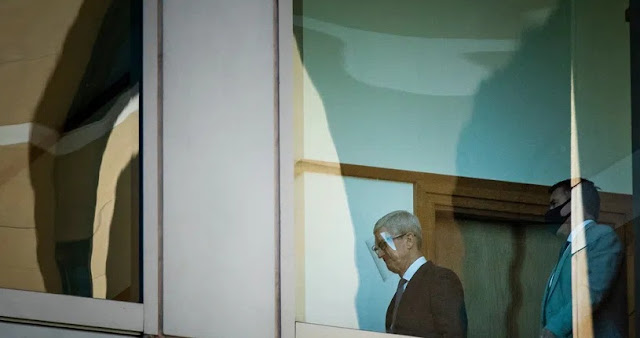It was a historic appearance. On 22nd May, Tim Cook, the CEO of Apple, defended his group against the lawsuit of the video game manufacturer Epic Games . It was the first time in the company's history that Cook appeared in this role as a witness in a court of law. The trial is about the allegation that the iPhone manufacturer, with a market value of two trillion US dollars, is abusing its market power in order to collect high fees from independent app developers. The outcome of the proceedings could decide how the billions in profits from mobile digital applications will be distributed in the future.
Cook came through the Oakland District Court garage to avoid the journalists waiting outside the building. The 60-year-old, who took over after the death of the founding legend Steve Jobs in 2011, responded to the questions of the Apple lawyer with calm remarks on Apple's focus on "protecting its customers". Apple wants to guarantee this "security, reliability, quality and data protection". This is only guaranteed if it controls third-party access to its customers via apps - such as games.
It's an argument Apple keeps making. Cook himself said in an interview that if the company had to open its user platform, the App Store, it could turn into a "flea market". "And you know how much confidence buyers have in a garage sale," he warned.
30 percent fee to Apple
The case that has been heard by judge Yvonne Gonzalez Rogers for three weeks is not exactly David versus Goliath. The plaintiff in these proceedings, Epic Games, is the developer behind the best-selling game Fortnite . In 2018 and 2019 alone, the first two years after its release, the company made over nine billion dollars with the video game . The lawsuit came when Epic offered its customers the option of paying directly to the company last year instead of going through the App Store. It wanted to save the 30 percent fee that Apple charges app providers for such transactions. As a result, Apple threw the Epic offers from its App Store. Users can no longer download the games to their iPhones or iPads.
Read also: The Trial That Will Define The Future Of Apps
Epic alleged that Apple was using its dominant market position to collect an "Apple tax" and went to court in August. By no means does his company have a monopoly, Cook now claimed in court. In fact, the Group's market share in the global smartphone market is behind competitors like Samsung. Cook put it at 15 percent in court. The majority of the over one billion iPhone users are in China and the United States. Cook also rejected Epic's allegation that Apple was hindering free competition and holding back independent developers. The App Store made software cheaper for consumers and gave them access to innovations and "millions of offers". Cook called the App Store an "economic miracle". The fee Apple charges from app providers like Epic They also serve to ensure the security of the apps for customers. The alternative to the App Store, as Epic wanted to introduce, was "terrible", claimed the Apple CEO. Consumers would then have to pull out their credit card for every single app they wanted to load onto their smartphone. That would also increase the risk of fraud.
Under cross-examination, Epic's attorney attempted to shake Cook's credibility by confronting him with previous statements and publications by the group. Especially when it came to the question of the profit that Apple siphoned off from the App Store, he did not give up. Experts Epic had previously called to the witness stand said Apple's profit margin was close to 80 percent. Cook, who seemed more relaxed, denied this figure. The Apple boss claimed that he could not provide any information on the actual margin, as the company did not identify them. When asked if the App Store was profitable, Cook said he "felt" it was.
Judge sees serious lack of competition
Unlike before a jury, Cook's behavior is likely to have less of an impact on the outcome of this case. Judge Gonzalez Rogers is known for disapproving of theatrical performances by lawyers or witnesses. The native Texan, who was appointed by President Obama in 2011, has some experience in technology cases. She has chosen Apple several times in the past. But on Friday, towards the end of Cook's survey, she surprised the Apple CEO with tough questions. The lack of competition for the 30 percent that Apple deducts for itself is "worrying," she said at one point.
Read more: Xbox or Playstation
Apple defends the fee, among other things, by stating that it is customary in the market. In fact, game console providers such as Nintendo Switch, Sony's PlayStation or Microsoft's Xbox also raise 30 percent. Cook also noted that Apple accommodated smaller app developers with annual sales of less than $ 1 million last year and cut the fee for them in half. That was a reaction to the corona crisis. But Gonzalez Rogers doubted that was the real motivation. It appeared to her more like a reaction to pressure from investigations and litigation, the judge said.
The decisive factor will now be how Gonzalez Rogers assesses the 30 percent collection under antitrust law. Cook's questioning, which spanned several hours, was the culmination of the process, which is expected to conclude early next week. Then the judge will need several weeks to come to her decision. Gonzalez Rogers herself has noted that she expects the loser to appeal. No matter how this current process turns out, Apple will not be getting rid of the question of what a monopoly looks like in the digital economy anytime soon. It's not just Fortnite's lawsuitDeveloper who troubles Apple. In addition to the EU and UK antitrust authorities, the US Department of Justice is also investigating the Group's business practices.
Do You Know What I Have Posted On Twitter Facebook Instagram Reddit tumblr










0 Comments